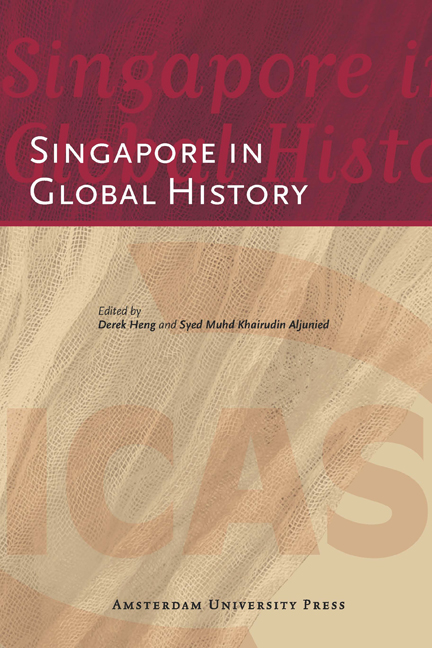Book contents
- Frontmatter
- Contents
- List of Tables and Illustrations
- Foreword
- 1 Globalising the History of Singapore
- 2 Situating Temasik within the Larger Regional Context: Maritime Asia and Malay State Formation in the Pre-Modern Era
- 3 The Singapore River/Port in a Global Context
- 4 ‘Walls of Illusion’: Information Generation in Colonial Singapore and the Reporting of the Mahdi-Rebellion in Sudan, 1887-1890
- 5 The Littoral and the Literary: Making Moral Communities in the Straits Settlements and the Gold Coast in the late Nineteenth and Early Twentieth Century
- 6 Social Discourse and Economic Functions: The Singapore Chinese in Japan’s Southward Expansion between 1914 and 1941
- 7 The Dynamics of Trans-Regional Business and National Politics: The Impact of Events in China on Fujian-Singapore Tea Trading Networks, 1920-1960
- 8 Rambutans in the Picture: Han Wai Toon and the Articulation of Space by the Overseas Chinese in Singapore
- 9 The Global Effects of an Ethnic Riot: Singapore, 1950-1954
- 10 The British Military Withdrawal from Singapore and the Anatomy of a Catalyst
- 11 Bringing the International and Transnational back in: Singapore, Decolonisation, and the Cold War
- 12 The Global and the Regional in Lee Kuan Yew’s Strategic Thought: The Early Cold War Years
- 13 A Brief History of the Hub: Navigating between ‘Global’ and ‘Asian’ in Singapore’s Knowledge Economy Discourse
- About the Contributors
- Bibliography
- Miscellaneous Endmatter
12 - The Global and the Regional in Lee Kuan Yew’s Strategic Thought: The Early Cold War Years
Published online by Cambridge University Press: 02 February 2021
- Frontmatter
- Contents
- List of Tables and Illustrations
- Foreword
- 1 Globalising the History of Singapore
- 2 Situating Temasik within the Larger Regional Context: Maritime Asia and Malay State Formation in the Pre-Modern Era
- 3 The Singapore River/Port in a Global Context
- 4 ‘Walls of Illusion’: Information Generation in Colonial Singapore and the Reporting of the Mahdi-Rebellion in Sudan, 1887-1890
- 5 The Littoral and the Literary: Making Moral Communities in the Straits Settlements and the Gold Coast in the late Nineteenth and Early Twentieth Century
- 6 Social Discourse and Economic Functions: The Singapore Chinese in Japan’s Southward Expansion between 1914 and 1941
- 7 The Dynamics of Trans-Regional Business and National Politics: The Impact of Events in China on Fujian-Singapore Tea Trading Networks, 1920-1960
- 8 Rambutans in the Picture: Han Wai Toon and the Articulation of Space by the Overseas Chinese in Singapore
- 9 The Global Effects of an Ethnic Riot: Singapore, 1950-1954
- 10 The British Military Withdrawal from Singapore and the Anatomy of a Catalyst
- 11 Bringing the International and Transnational back in: Singapore, Decolonisation, and the Cold War
- 12 The Global and the Regional in Lee Kuan Yew’s Strategic Thought: The Early Cold War Years
- 13 A Brief History of the Hub: Navigating between ‘Global’ and ‘Asian’ in Singapore’s Knowledge Economy Discourse
- About the Contributors
- Bibliography
- Miscellaneous Endmatter
Summary
“You can always survive a mistake in domestic affairs but you can get killed by one made in foreign policy” (Freeman 1997: 154)
“The foreign policy of Singapore must ensure, regardless of the nature of the government it has from time to time that this migrant community that brought in life, vitality, enterprise from many parts of the world should always find an oasis here whatever happens in the surrounding environment”
Introduction
In studying Lee's strategic thought, it is imperative to ask: what do I mean by ‘strategic thought’? The term ‘strategy’ means different things to different scholars. In the words of a strategic studies scholar, Bernard Loo, “at the end of the day, however, it seems to me that these notions of strategy really focus on the traditional definitions of security – the absence of external threats to states, in terms of both sovereignty as well as territorial integrity. In that regard, conceptions of geopolitics and how it translates into foreign policy exist quite comfortably within the rubric of security; and strategy (however defined) can be thought of as the logic that underpins the ways in which the use of instruments of power and force (both military as well as non-military) helps to ensure this ‘security’.” This article is therefore about Lee Kuan Yew's philosophy on foreign policy, his thinking on geopolitics as well as war and peace, all the while bearing in mind Raymond Aron's dictum that strategic thought “draws its inspiration each century, or rather at each moment in history, from the problems which events pose” (Buchan 1970).
Lee's strategic thought was essentially shaped by Singapore's unique situation as a small island state without a hinterland located in a strategic yet vulnerable region. It was formed against the backdrop of the worsening Cold War between the anti-communist West and the expanding communist bloc, which stretched across the Eurasian mainland to China, with the nations of the nascent non-aligned movement caught somewhere in between. As Lee reminded his audience in his S. Rajaratnam Lecture in 2009, “small countries have little power to alter the region, let alone the world.”
- Type
- Chapter
- Information
- Singapore in Global History , pp. 235 - 268Publisher: Amsterdam University PressPrint publication year: 2012



